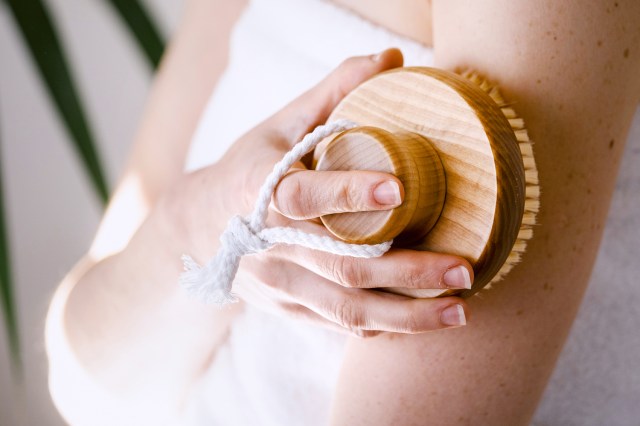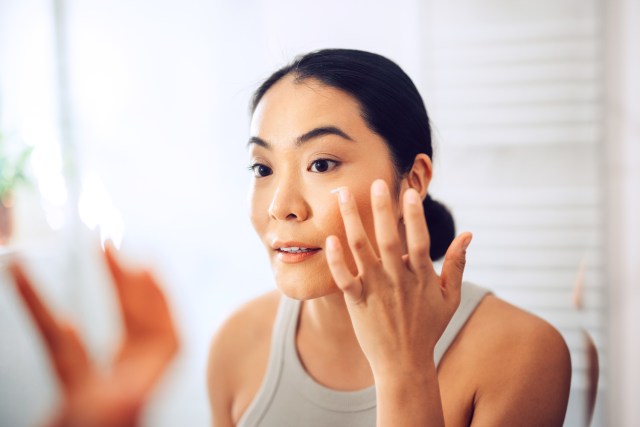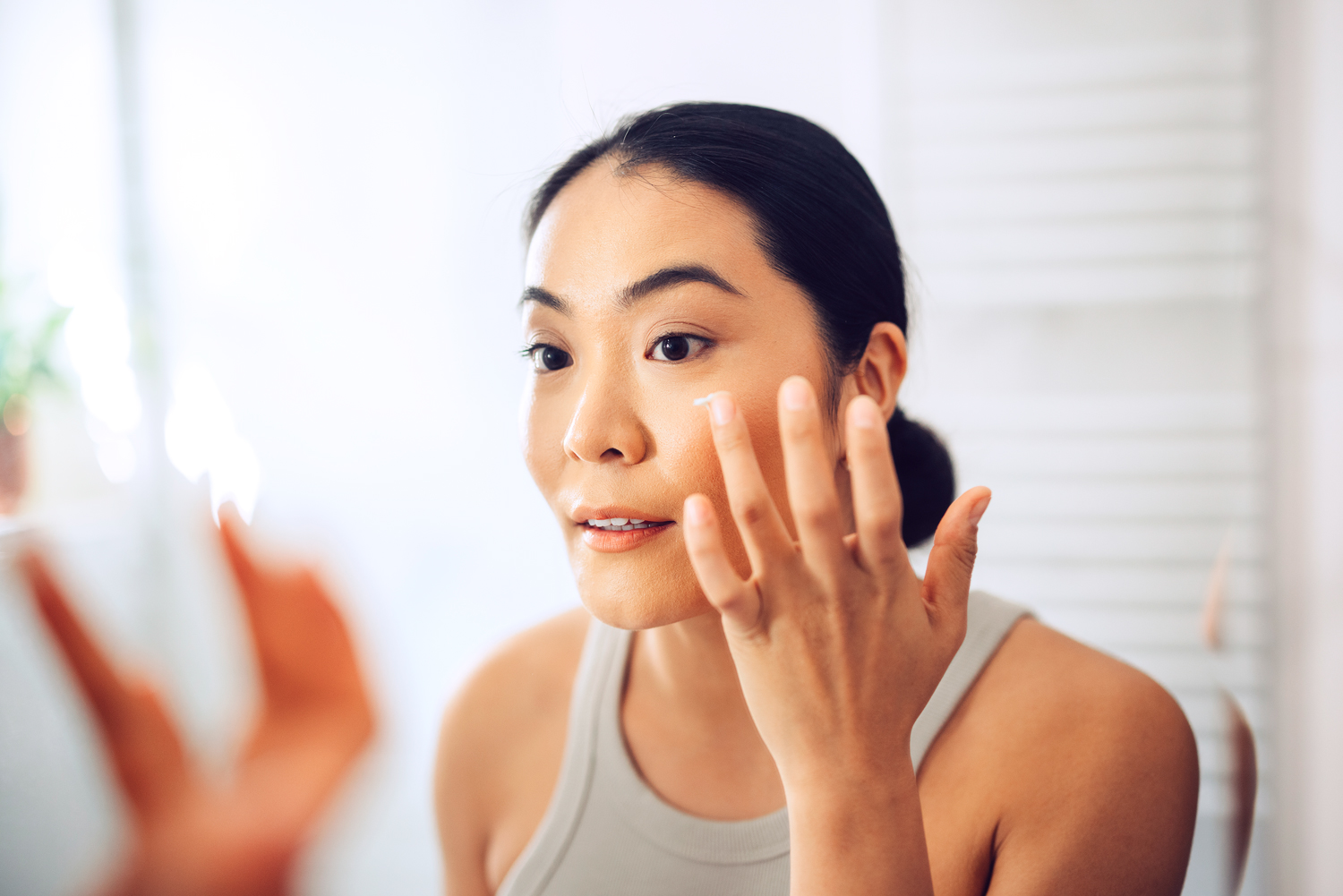We independently evaluate all recommended products and services. If you click on links we provide, we may receive compensation.
If you spend any amount of time browsing beauty accounts on social media or scrolling through skin care forums on Reddit, there’s a good chance you’ve come across the term “skin barrier.” Given the name, you may assume that the skin barrier is akin to an invisible shield that protects your skin from harm. And you’d be right, to a degree — but it’s also so much more than that.
To explain what the skin barrier is and why it’s so crucial for healthy skin, we tapped board-certified dermatologist and cosmetic surgeon Dr. Stephani Kappel, M.D. Here, Dr. Kappel explains everything you need to know about your skin barrier and shares some expert advice on keeping it healthy and protected day in and day out.

What Is the Skin Barrier?
Before we dive into what the skin barrier is, a little anatomy lesson is in order. The skin has three main layers: the hypodermis, the dermis, and the topmost layer, the epidermis. This outermost layer is the part of your skin that you can see with the naked eye. According to Dr. Kappel, the skin barrier (also known as the stratum corneum) is the outermost layer of the epidermis. It’s composed primarily of dead skin cells and lipids, which together form a “shield” that helps to keep your skin protected from the outside world.

What Does the Skin Barrier Do?
The skin barrier “serves as our body’s first line of defense,” Dr. Kappel explains. Its primary purpose is to prevent harmful substances — such as the pollutants, irritants, and bacteria we come into contact with every day — from entering our skin and wreaking havoc. It also helps trap moisture within your body and aids in the regulation of your body temperature. In short, Dr. Kappel says, “the skin barrier and its healthy function are crucial for maintaining your skin health and integrity.”
Of course, your skin barrier has to be intact and healthy in order to do its many jobs effectively. Unfortunately, plenty of things — from unprotected sun exposure to harsh exfoliation — can compromise the skin barrier, leaving you vulnerable to skin damage.

What Are the Signs of a Damaged Skin Barrier?
Since your skin barrier is, for all intents and purposes, invisible, you may be wondering how to tell if yours is in good shape or if it needs a little TLC. Keep an eye out for the following skin concerns; the presence of one (or more) of these, Dr. Kappel says, may be a sign that your skin barrier could use a little love:
- Excessively dry or dehydrated skin
- Sensitivity, irritation, and discomfort
- Redness
- Unexplained or hard-to-control acne
- Eczema

How Do You Protect Your Skin Barrier?
Protecting your skin barrier from damage requires a two-pronged approach. First, Dr. Kappel says, it’s important to limit your exposure to stressors, such as air pollution, harsh cleansers, extreme temperatures (both hot and cold), and, of course, sun exposure. You can’t avoid external stressors entirely — not without spending your days in a climate-controlled cave, anyway — but that’s where skin care comes into play.
A gentle approach is key when it comes to skin barrier care, Dr. Kappel says. She recommends looking for products that are pH-balanced and contain “barrier-supporting ingredients,” such as ceramides and hyaluronic acid — both of which are natural (and essential) components of a healthy skin barrier. Other ingredients she recommends for barrier care include niacinamide, peptides, and lipids including squalane to help “support the structural integrity of the skin barrier.”

Try This Barrier-Supporting Skin Care Routine
While your skin care routine should be tailored to your skin’s specific needs and concerns, there are a few steps she recommends everyone follow.
Step 1: Cleanse
Cleansing, moisturizing, and protecting your skin from UV rays are the key components of an effective skin care routine, per the National Institutes of Health. Cleansing is particularly important for a healthy skin barrier, as washing your face helps remove dirt, pollutants, and irritants before they have a chance to damage your skin. Dr. Kappel recommends washing your face morning and night with a gentle, pH-balanced cleanser that won’t strip your skin of its natural protective oils. Try MDAire Bio-Cleanse 5.5 Face Wash. It contains a blend of antioxidant-rich fruit extracts to detoxify without stripping the skin barrier.
Step 2: Apply Treatments
You don’t have to use toners or serums, but they can be useful if you have a specific skin concern you’d like to target or want to give your skin an extra layer of hydration. If you do want to use a skin care treatment, we suggest opting for one that contains antioxidants that can help protect your skin from damaging free radicals. We love Maelove Glow Maker Vitamin C Serum, which also contains vitamin E and ferulic acid for extra antioxidant benefits.
Step 3: Moisturize
Your skin barrier needs adequate hydration to function properly, so the next thing you’ll want to reach for is a moisturizer. Generally speaking, lightweight water-based moisturizers are ideal for those with oilier skin types, while richer cream formulas tend to be better tolerated by those with drier skin. If you’re unsure which moisturizer to use, opt for one that’s designed for all skin types, such as Kiehl’s Ultra Facial Cream With Squalane.
Step 4: Apply SPF in the A.M.
We’ve said it before and we’ve said it again: Sunscreen is truly a nonnegotiable if you want your skin to look and feel its best. The FDA advises everyone to wear a broad-spectrum sunscreen with an SPF of at least 30 every day. You’ll also want to take care to reapply it every two hours — more often if you’re sweating or swimming.
Remember that when it comes to skin care, one size does not fit all. If you need help creating a skin care routine or have specific concerns that you’d like to address, your best bet is to consult a dermatologist — they can help you determine how best to care for your skin.
This article is for general informational purposes only.
Affiliate Disclaimer Medical Disclaimer
















 Unique Beauty is free for all users.
Unique Beauty is free for all users.